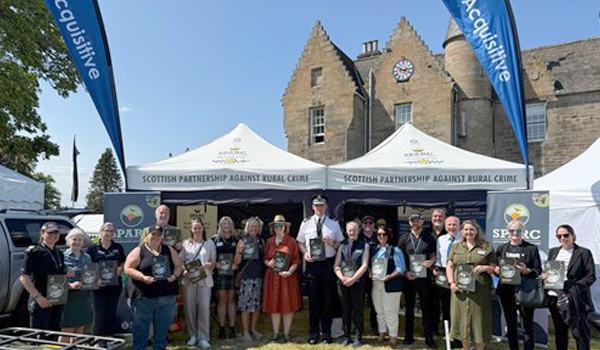Scottish three-year rural crime strategy launched
The Police Scotland-chaired Scottish Partnership Against Rural Crime (SPARC) has launched its 2025-2028 strategy, which has “crime prevention and education at its core”.
This third iteration continues the work the multi-agency partnership has been doing over the past nine years to prevent, reduce and tackle rural crime across Scotland.
The strategy was launched by SPARC partners at last week’s Royal Highland Show and sets out the key priorities for the next three years.
Five rural crime priorities have been identified, which each have a SPARC partner as their lead. These priorities are; rural machinery, tool, fuel and metal thefts; livestock crime; equine incidents; fly-tipping and heritage crime.
The focus for the next three years also centres on crime prevention and education.
In April 2025, 109 police officers received training on Vinchip stolen vehicle identification techniques and technology to prevent and tackle thefts of agricultural machinery and equipment from farms.
Through further partnership working under SPARC, Police Scotland will shortly be training a further 12 officers as Institute of the Motor Industry (IMI) accredited Stolen Vehicle examiners across Scotland to further enhance its capability to target and disrupt the theft of rural machinery.
Crime prevention continues with partners through local PARCs (partnerships against rural crime) and raising awareness of the impact of rural crime.
Police Scotland Assistant Chief Constable Tim Mairs, SPARC chair, said: “SPARC is a proven partnership that has been running for a number of years involving a range of organisations that operate within the rural community.
“Tackling rural crime is a priority for Police Scotland which is strengthened by the work of SPARC members.
“The five rural crime priorities are each led by the agency that is best placed to lead, supported by Police Scotland and the other partners.
“This strategy has crime prevention and education at its core and we know that crime prevention does work. Agricultural theft can have a significant financial loss but is also disruptive and disturbing to local communities and individual’s livelihoods.”
He added: “Scotland has many diverse rural environments. We are committed to working together to protect our communities by deterring, disrupting and detecting criminal activity. I am confident this continued partnership will make a real impact with various preventative and enforcement activities.
“I want to reassure these communities that if they are affected, please report incidents to us. We will investigate to identify those responsible.”


